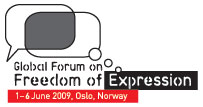Freedom for sale
It wasn’t quite like ordering pork in a kosher restaurant or flirting with the vicar’s wife, but my invitation to one of Singapore’s top intellectuals to justify curbs on liberty was not exactly what the free speech community was used to.
Still, I was pleased that at one of Index on Censorship’s events at the Global Forum for Free Expression in Oslo Professor Chua Beng Huat was given the chance to explain, in his words, the dangers of parasitic individualism.
Up against Prof Chua was a Russian journalist, Maxim Trudolyubov, an editor at the business paper, Vedomosti. He sought to explain, but in no way defend, a tendency among many Russians to associate the political liberalisation of the 1990s with material impoverishment.
Chua sought to differentiate between political discourse, which is heavily circumscribed through the application of perhaps the world’s most draconian defamation laws, and cultural and economic expression, which he categorised as increasingly free. He linked this with what he termed the efficiency of the government, consistently high growth rates and to a single party which has run the city state for 50 years.
I have heard this point made consistently on my various travels to Singapore, the country where I was born. It flies in the face of almost any western interpretation of free expression, but I have heard it expressed cogently, if somewhat embarrassedly, by intelligent and well-travelled Singaporeans.
Both Chua and Trudolyubov agreed with one of the main arguments of my forthcoming book, Freedom For Sale, in which I argue that the vast majority of people, whatever the country, culture and circumstance, appear increasingly willing to trade their liberty for the promise of either prosperity or security.
I also differentiate between what I call “private” freedoms –– to travel, live where you want, do what you want in your personal life –– and the “public” freedoms of free expression and free association, which are considered more expendable.
The audience agreed that self-censorship was now a far bigger threat than the traditional mechanisms of state control. One participant, a Croatian who had spent some years studying at Stanford University, argued that censorship was alive and well in the US, but deployed more subtly, through peer pressure and the desire not to stand out in the crowd or to be deemed extreme. Thus, he suggested, otherwise enquiring students were prepared to stay silent on politics, race and other contentious issues.
Can individuals, he asked, be trained to be stupid? Food for thought, but not the customary fare.


